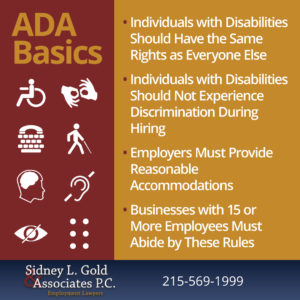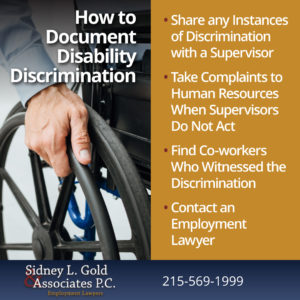Disability Discrimination
The Americans with Disabilities Act of 1990 (ADA) was a step in the right direction for the civil rights of individuals with disabilities in the workplace and beyond. Under the ADA, those who had previously been negatively impacted by discrimination in the workplace could benefit from federal protection. However as influential this act may be, individuals with disabilities still experience discrimination in the workplace.
Cherry Hill employment lawyers at Sidney L. Gold & Associates, P.C. understand that many individuals with disabilities face discrimination in the workplace. We fight for disabled workers and ensure their rights are protected under the ADA, help them receive the accommodations they deserve, and recover compensation for all when necessary.
What Do the Numbers Say?
The Center for Talent Evaluation found that 30 percent of people in white collar jobs identified that they have some sort of disability. The National Organization on Disability found that only 3.2 percent of employees self-identify as disabled. Most commonly, people with disabilities are afraid to say so because they want to be hired. Employees simply want to go to work and earn a living without making any trouble, and that leaves them more vulnerable to discrimination over time.
Sixty-two percent of employees have what is known as an invisible disability. Forty-four percent of employees with visible disabilities and 40 percent with invisible disabilities reported some form of discrimination at work. We ask that victims reach out to our legal team as soon as possible whether they have revealed their disability or not.
Understanding the ADA
The ADA outlines specific rules regarding employment for individuals with disabilities and operates under the auspices of the New Jersey Law Against Discrimination (NJLAD). Victims have every right to file a complaint if they believe their rights have been violated. The ADA affirms that:
- Individuals with disabilities should have the same rights and opportunities as everyone else who needs a job
- Individuals with disabilities must not be discriminated against in the hiring process
- It is the responsibility of the employer to provide reasonable accommodations to an employee or applicant with a documented disability
- Businesses with 15 or more employees shall make the necessary accommodations for their staff
The purpose of the ADA is to prevent discrimination in the workplace that was not necessarily covered under Title VII of the Civil Rights Act of 1964. Other parts of the law prevent discrimination when using public services, receiving public assistance, using telecommunications services, and using transportation services.
Victims may experience more than one type of discrimination at work, including racial discrimination, gender discrimination, or religious discrimination. Those issues are also covered under the NJLAD. We are happy to help victims with any form of discrimination they have been subjected to, and we will help file a complaint with their employer. When we review a disability discrimination case, however, we focus on what the ADA says about workplace accommodations. 
Defining a Reasonable Accommodation
A reasonable accommodation is anything that allows a qualified employee with a disability to perform their job. Because the ADA wants disabled persons to have the same opportunities as everyone else, these accommodations simply level the playing field to make it fair for those with disabilities. Such accommodations take many forms, depending on the employee’s disability, but most often include:
- Providing temporary work specialists to aid in training for the job
- Hiring readers or interpreters for employees who need them
- Providing a reasonable amount of additional leave for medical purposes
- Giving an employee more time to complete a task
- Restructuring the hours in a workday for medical reasons
- Modifying desk heights and installing computer screen magnifiers or readers for employees in need
The ADA notes that reasonable accommodations should not create an undue hardship for the employer, and employers often exploit this language as much as they can. Employers can be quite crafty when showing that it would be too expensive or complicated to accommodate disabled employees. In even more extreme cases, employers may simply tell their disabled employees that they slow down the office and/or cost too much money. Victims have a right to stand up for themselves and to an accommodation that any reasonable person would see is necessary. Working with an attorney will help victims receive the assistance they need and ensure that other disabled employees do not suffer the same fate.
Violations of the ADA
Despite the requirements of the ADA being concise and well-known, many employers still discriminate against potential and current employees with disabilities. Whether or not this is done unintentionally, disability discrimination could severely hinder an individual’s career goals. Sadly, this form of employment discrimination is the majority of complaints as employers often question how effective a disabled employee may be or believe that investing in reasonable accommodations will be too costly. Such practices are inherently discriminatory and could leave an employer facing harsh penalties.
How Should I Deal with Discrimination at Work?
Employers often violate the ADA without realizing it. Some managers or business owners willingly violate the ADA because they believe it is too expensive to provide the accommodations employees need, or there may be preconceived notions that need to be overcome. Victims can take the following steps to deal with disability discrimination at work:
- Note the discrimination when speaking to a supervisor
- Take the complaint to human resources if a supervisor does not take it seriously
- Discuss the discrimination with co-workers who witnessed the discrimination
- Contact an employment lawyer
We understand that victims do not want to threaten a lawsuit every time there is an issue in the office. If a victim goes to human resources with their issue, they can correct the problem internally. The human resources department should open an investigation into each claim, and they can re-train managers or supervisors who do not understand how to accommodate disabled workers.

Victims may, however, not notice a difference in behavior or their work situation and may also be met with a hostile work environment because they reported the problem. Because the level of discrimination has risen, reach out to us for assistance. If victims believe that their co-workers are contributing to the discrimination, let them know that their way of thinking is incorrect and that the issue has been reported. In many cases, discriminatory behavior may stop because a victim spoke up. Conversely, if co-workers witnessed the discrimination, they can help corroborate the story.
When a company does not deal with the problem, contact one of our expert attorneys for assistance. We can help file a complaint if a victim fears retaliation, or we can help them present the case to an employer. In many instances, an employer will take our report seriously because it comes from licensed attorneys.
Should I Disclose My Disability on a Job Application?
Under the ADA, individuals do not need to identify as disabled on an application. Even though an individual has no plans to reveal a disability on the application, employers have come up with clever ways to determine if the applicant has a disability. Applications may question of the individual can lift up to 20 pounds. This is simply an easy way for the employer to remove disabled applicants from the pool. “Must have reliable transportation” is also used to weed out people who are disabled or use public transportation. Many disabled individuals cannot drive, and they often feel discouraged or do not apply.
What if I Returned from Family Medical Leave?
Family medical leave violations are common among employers because they do not believe that employees know their rights. Employees may have taken appropriate leave to deal with a serious medical condition and returned to work with disabilities that an employer must account for. Some employees have problems with companies that try to force them to return to work early. Employees are permitted up to 12 weeks of medical leave a year under the Family Medical Leave Act (FMLA) and should not be forced to return early if their employer holds their job over their head.
If an employee returns from medical leave with a disability, their employer may carry on as if nothing has happened. Even though an employee notified their employer of their disability and requested accommodations, they may need our help to ensure they are given the services entitled under the law. Do not hesitate to work with our team when experiencing disability discrimination upon one’s return to work.
Be Aware of Subtle Discrimination
Please keep in mind that some discrimination is subtle. Discriminatory practices may have been enacted by an employer that disproportionately impacts those with disabilities, but the policies might seem to be otherwise benign. There are, however, times when a business uses poor judgement or is unfair. Not all problems encountered at work may qualify as discrimination, and that is why we need to review each case thoroughly.
Co-workers may be asked to complete tasks that are simple for them because they are not disabled. An employer may continually ask the disabled employee to complete tasks such as this, and they will feel discouraged to the point of quitting. This type of discrimination is often missed because victims feel responsible. Disability discrimination might involve a willingness to provide accommodations that never materialize. Victims also feel guilty because of the cost of the accommodations. These factors should be reviewed by a lawyer as soon as possible.
How are Victims Compensated for Disability Discrimination?
In the majority of cases, victims simply want to be accommodated properly. An employer, however, may be liable for punitive and compensatory damages in a case. Our lawyers will investigate each case, collect evidence, and explain any legal recourse victims have. Victims may be entitled to compensatory or punitive damages because of the discrimination suffered.
Cherry Hill Employment Lawyers at Sidney L. Gold & Associates, P.C. Represent Victims of Disability Discrimination
If you or a loved one suspects that an employer denied employment, advancement opportunities, or terminated your employment based on your disability, you are urged to reach out to the Cherry Hill employment lawyers at Sidney L. Gold & Associates, P.C. Call us today at 215-569-1999 or contact us online for a free consultation. Located in Pennsauken, New Jersey, we serve clients throughout South Jersey, including Cherry Hill, Haddonfield, Marlton, Moorestown, and Mount Laurel.





























